|
|
|
Sort Order |
|
|
|
Items / Page
|
|
|
|
|
|
|
| Srl | Item |
| 1 |
ID:
180305
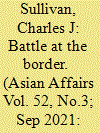

|
|
|
|
|
| Summary/Abstract |
The deadly skirmishes along the disputed border of Kyrgyzstan and Tajikistan in late April 2021 stand out in comparison to other recent clashes between residents of this remote area. This article analyzes the 2021 border conflict. Furthermore, it stands to reason that the current political climate serves to hinder any resolution to this interstate dispute. Lastly, since skirmishes between Kyrgyzstan and Tajikistan (both members of the Collective Security Treaty Organization) serve as a source of potential embarrassment for the Russian Federation, Moscow will seek to assert its leverage, in the hopes of avoiding future clashes and maintaining its hegemony over Central Asia.
|
|
|
|
|
|
|
|
|
|
|
|
|
|
|
|
| 2 |
ID:
179339
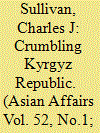

|
|
|
|
|
| Summary/Abstract |
Although Kyrgyzstan has recently withstood two coup d'états (or so-called “revolutions”) and a bout of ethnic violence, the politicization of the legal system by successive presidents portends a troublesome future. The 2017 transition from Almazbek Atambaev to Sooronbai Jeenbekov gave way to the former's arrest and imprisonment. A series of other prior arrests and incarcerations of (former) parliamentarians indicate that Kyrgyzstan's presidents are regularly manipulating the legal system to persecute and neutralize their rivals. This article posits that the repetitive rupturing of legal institutions will usher in an era of heightened illiberalism, elite uncertainty, and the further discrediting of the political system, thereby placing the state on the brink of failure. The mass uprising in response to the October 2020 parliamentary electoral results and most recent coup d'état indicate that the prospects of the Kyrgyz Republic suffering a collapse are real.
|
|
|
|
|
|
|
|
|
|
|
|
|
|
|
|
| 3 |
ID:
174774
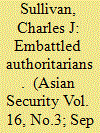

|
|
|
|
|
| Summary/Abstract |
Why are some authoritarian leaders able to stave off violent challengers to their rule while others falter? This article analyzes several case studies involving a series of nondemocratic governments and violent non-state actors waging war and posits that different combinations of variables lead to dissimilar outcomes (ranging from “civil war/insurgency”, “regime implosion” or “foreign-based overthrow”, “negotiated peace”, to “strategic advance and retreat”). Accordingly, “embattled authoritarians” require a high level of “political-military aid” over time from a supportive foreign power to effectively combat “violent non-state challengers”. However, it is difficult for such governments to completely escape from “embattled” status, particularly if a supportive foreign power does not exert influence to set parameters for peace between the warring parties and the level of international interference (i.e. political-military aid abetting violent non-state challengers courtesy of other foreign powers) does not recede over time. This article concludes with a forecast on Afghanistan and Tajikistan’s respective futures and discusses how the onset of political instability within the former may serve to destabilize the political situation in the latter.
|
|
|
|
|
|
|
|
|
|
|
|
|
|
|
|
| 4 |
ID:
191930
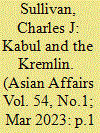

|
|
|
|
|
| Summary/Abstract |
Since mid-2021, Moscow has adhered to a foreign policy vis-à-vis the Taliban referred to here as “muted diplomacy”. Russia has not officially recognized the Taliban, but the Kremlin maintains trade relations with the newly reestablished Islamic Emirate of Afghanistan. From Moscow’s perspective, it is prudent to engage with the Taliban, for there is no other actor that can exert political authority within the war-torn country. Yet the Taliban also plays an important role with regards to Russia’s regional ambitions pertaining to Central Asia. In considering how the Russo-Ukraine War has undermined Moscow’s standing among the Central Asian Republics, Russia seeks to preserve its hegemony, partially by restricting the “Stans” potential to acquire geopolitical maneuverability vis-à-vis Taliban-controlled Afghanistan. Consequently, Russia’s evolving foreign policy towards the Taliban is grounded in delaying other nearby states’ normalization of relations with Kabul in the hopes of maintaining its regional stature, as well as in engaging with the sole entity in Afghanistan that stands a chance of averting a state collapse, redolent of the 1990s.
|
|
|
|
|
|
|
|
|
|
|
|
|
|
|
|
| 5 |
ID:
184400
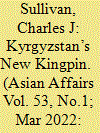

|
|
|
|
|
| Summary/Abstract |
This article analyzes Sadyr Japarov's first year in power as the newly elected President of the Kyrgyz Republic. In learning from the mistakes of his governing predecessors, Japarov is attempting to construct and consolidate an authoritarian system. Japarov may ultimately succeed in this endeavor, but Kyrgyzstan will likely forfeit much of its sovereignty to Russia along with its quasi-democratic institutions in exchange for a strongman-style government.
|
|
|
|
|
|
|
|
|
|
|
|
|
|
|
|
| 6 |
ID:
182830
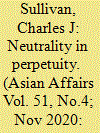

|
|
|
|
|
| Summary/Abstract |
Since the passing of Turkmenistan's first president, Saparmurat Niyazov, in late 2006, Gurbanguly Berdymukhamedov has ruled over Turkmenistan. Although authoritarian regimes occasionally undergo reform following a transition from one leader to the next, the dictatorship in Ashgabat remains intact and Berdymukhamedov has not modified his predecessor's foreign policy doctrine. Why though has Turkmenistan chosen not to revise its “permanent neutrality” status under new leadership? This article stipulates that the ruling elites in Ashgabat have preserved Turkmenistan's neutrality for three reasons. First, in contrast to other isolated dictatorships, the government of Turkmenistan does not have to contend against any state adversaries or antagonize a foreign power to legitimate its rule. Instead, Turkmenistan portrays itself in the United Nations General Assembly as an exemplary neutral state and this affords the regime latitude in navigating geopolitics. Second, while Berdymukhamedov has revised aspects of the Niyazov dictatorship, the Arkadag personality cult heralds him as the “protector” of Turkmenistan's sovereignty. “Permanent neutrality” thus undergirds the president's political legitimacy to some degree. Third, Turkmenistan's neutrality contributes to the ruling elites' maintenance of a corrupt and repressive regime through which they exert control over the economy. Hence, in spite of many challenges facing the country, the ruling regime will likely endure.
|
|
|
|
|
|
|
|
|
|
|
|
|
|
|
|
| 7 |
ID:
158948
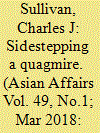

|
|
|
|
|
| Summary/Abstract |
Russia's military intervention in Syria (2015-present) has ensured the Assad regime's survival to date. Why though has Russia succeeded in achieving its objective? This article provides an analysis of Russia's involvement in the Syrian civil war in comparison to the Soviet Union's military debacle in Afghanistan (1979-89). Accordingly, by avoiding the USSR's mistakes in Afghanistan, this article posits that Russia has not become entangled in a protracted conflict in Syria. In Syria, Russia has militarily intervened to buttress the Assad regime, not to reorganize the host government's leadership and assume control over the war effort. Meanwhile, Syrian opposition forces lack concerted international support and Russia has allies that are assisting the embattled Syrian government. Lastly, Russia intends to ‘freeze’ the Syrian civil war in place by (i) pressuring opposition forces to submit and other countries to re-embrace Damascus in a diplomatic forum, (ii) endorsing Syria's claim to sovereignty, and (iii) relying upon a small military presence to deter others from destabilizing Assad's rule.
|
|
|
|
|
|
|
|
|
|
|
|
|
|
|
|
| 8 |
ID:
152656


|
|
|
|
|
| Summary/Abstract |
The Republic of Kazakhstan seeks to undergo modernization over the course of the next several decades and transform into one of the world’s top 30 economies. To fulfil this aim, the Kazakhstani government has designed a programme known as the ‘100 Steps’. If faithfully implemented, this package of reforms will gradually revolutionize the nature of Kazakhstani state–society relations, by remaking Kazakhstan into a more economically dynamic and politically pluralistic country. However, a series of bureaucratic-legal, economic, and socio-political challenges will need to be overcome in order for this to happen, and success or failure will ultimately be determined by the actions of the ruling elites.
|
|
|
|
|
|
|
|
|
|
|
|
|
|
|
|
| 9 |
ID:
165219
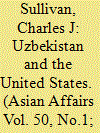

|
|
|
|
|
| Summary/Abstract |
Uzbekistan has recently initiated a series of reforms in the wake of (former) President Islam Karimov's death in 2016. To what extent and why does Tashkent seek to liberalize? Concurrently, the United States - which curtailed ties with the Uzbekistani government in the aftermath of the 2005 Andijan massacre - has expressed renewed interest. What do Washington and Tashkent seek to gain by improving relations? This article posits that while the United States aspires to bolster regional support for the War in Afghanistan, Uzbekistan is mainly interested in consolidating a new regime and balancing against nearby Great Powers. As such, President Shavkat Mirziyoyev's reformist drive should not be construed as a categorical embrace of good governance but a means to reestablish Uzbekistan's geopolitical footing after more than a decade of isolation. Based upon this assessment, both sides can work to foster avenues for cooperation, while the United States encourages Uzbekistan to liberalize at its own pace.
|
|
|
|
|
|
|
|
|
|
|
|
|
|
|
|
| 10 |
ID:
179346


|
|
|
|
|
| Summary/Abstract |
The Afghan Taliban appear to be on the verge of reconstituting the so-called Islamic Emirate of Afghanistan proto-state that was toppled in late 2001 by U.S., coalition and indigenous forces. A series of factors indicate that the Afghan government could implode from within or be swiftly overthrown by the Afghan Taliban unless the United States continuously reinforces Kabul with ample political-military aid. In addition, any future U.S.-led military reengagement would likely amount to a replay of the events of late 2001 or worse, thereby prolonging the war. Lastly, there is little reason to expect that the Afghan Taliban leadership will temper its ideological aspirations, sever ties with designated terrorist groups, or moderate its governing style in return for international recognition or under threat of punitive repercussions. As such, how the United States manages its anticipated withdrawal in the coming months will have major ramifications, and America should prepare for the possibility of an historical recurrence of the collapse of the Afghan government reminiscent of the downfall of the Soviet-sponsored Communist regime in 1992.
|
|
|
|
|
|
|
|
|
|
|
|
|
|
|
|
|
|
|
|
|